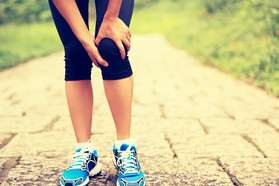Top 5 Tips for Injury Prevention
4/14/2016
By: Sonia Gashgarian, Physiotherapist  With warmer weather (hopefully) soon approaching, we can spend more time outdoors enjoying the sunshine and fresh air after a long winter season. For a lot of people, the warmer weather also means that outdoor sports and activities will be starting up again. If you are thinking of taking up a new sport or activity, or returning to a spring or summer league, here are my top 5 tips to help prevent injuries so you can enjoy your activity all season long: 1. PRE-SEASON TRAINING. To help get your body in peak shape for your upcoming activity, it is important to train the muscle and energy systems used during your activity. This involves gradually increasing your strength, balance, and endurance. For example, if your activity involves short bursts of running, try interval training to improve your anaerobic capacity; on the other hand, if the activity or sport lasts for a long period of time, improving your aerobic endurance is more suitable. If you are unsure of which strengthening exercises and/or training programs are right for you, a physiotherapist or other qualified health care professional can help you determine what areas you should focus on. 2. WARM-UP & COOL DOWN. An adequate warm-up should last between 10-15 minutes. Keep the exercises dynamic (stretching through movement) as much as possible to help warm-up the muscles and increase circulation. Some warm-up ideas include karaokes, knee-high running, butt kicks, and arm circles. After exercise, 5-10 minutes of light jogging clears lactic acid from the muscles, helping to prevent muscle soreness and stiffness the next day. 3. STAY HYDRATED. The average person loses between 1-1.5 litres of water for every one hour of exercise, so be sure to drink enough water before, during, and after you exercise to help prevent dehydration and muscle cramping. During those hot, humid summer days, this point is even more important to reduce the risk of heat stroke. If you sweat profusely or are exercising for over an hour, you will also need to replenish your electrolytes. 4. ALLOW FOR REST & RECOVERY. The general rule of thumb is to give at least 24 hours of rest between bouts of vigorous physical activity (e.g. a long run or bike ride, a game of soccer, or a tournament). However, light exercise, such as cycling with light resistance or lifting light weights, can be done on rest days. One of the most common times we injure ourselves is when we are tired. If your muscles and body aren’t given enough time to recover from the previous activity, your form and performance may pay the price, and the risk of injury increases as a result. 5. EQUIPMENT. Having the proper footwear and protective equipment will help to protect against any head and/or body injuries. While having the proper equipment for your activity is important, it is also necessary to make sure everything fits you properly.
60 Comments
1 Week Enlightenment Challenge
2/13/2015
 Does winter have you in a rut? Do you feel like you are just going through the same routine day in day out? Come join us in our 1 week challenge! The purpose is simple; engaging our mind and body in proactive behavior. This challenge can be modified to your own standards and redesigned week after week with your creativity and personal goals. Day 1 - Squat Challenge- Do 100 squats today! It doesn't have to be all at once but reach 100 before the end of the day. Day 2 - Drink 8 glasses (2 L) of water today. Spice up your water by adding sliced cucumber, wedges of lime or lemon, and/ or fresh mint leaves.  Day 3 - PINS Challenge - Reflect to find one Positive, one Insightful, one Negative, and one Surprising experience you had today. What did you learn and how can you use this to become better tomorrow? Day 4 - Read for 20-30 minutes today. Start a new book or read an article of interest. Day 5 - Give a compliment to one friend or family member, one colleague, and one random person today. Day 6 - 2 Part Challenge - 1) Get at least 7-8 hours of sleep tonight. 2) Devote 10 minutes to self-time. Focus on your breath, practice meditation, or reflect in silence during this time. Be present, be still, be calm. Day 7 - Push, jump, sit challenge - Do 50 Push-ups, 50 Jumping Jacks, and 50 Sit-ups. You have 10 minutes to complete all 150. Finish by holding plank position for as long as you can! Fueling and Nutrition for Runners
12/12/2013
By: Dr. Sarah Vincent, ND  You get out of your body, what you put in, so the focus here should be on nutritional quality. In order to achieve your personal fitness goals you should be on good quality, clean, whole foods. Pre-run Fueling When preparing for your run, you should place emphasis on high carbohydrate, low fat, low protein, low fiber, eaten 2 hours before. The timing here is strictly dependent on the state of your digestion and speed of your overall metabolism, so this will be different for everyone. Ensure what you eat is easily digested and absorbed. Cooked, steamed, or liquids are easiest to digest. A few examples of what you could have, are: 1) A berry/shake with a little protein (half a scoop) 2) Oatmeal with yogurt and berries 3) Quinoa with chicken and veggies 4) Turkey sandwich/wrap with veggies 5) Almond butter and banana wrap Carbohydrate Loading This is useful for long bouts of endurance exercise, meaning 60 plus minutes and is only useful if muscles are already trained to store and use extra carbs. The majority of a runner’s carbohydrate intake should come from fruits and vegetables because they are nutrient dense and of higher quality. Foods such as refined grains (and for some people even whole grains) and processed carbohydrates, such as pastas, breads and cereals will give “more” in terms of volume, but are not as nutrient dense and will likely drain your energy. Depending on estimated energy expenditure of each person, ideal carbohydrate distribution is illustrated below: 1) Fruit (1-3 servings) 2) Vegetables (4-8 servings) 3) Beans/legumes (1-2 servings) 4) Whole grains (1-2 servings) Generally avoid high fat, high fiber foods as they require more energy to digest and will likely sit heavily in your stomach throughout your run. Also avoid coffee because it can stimulate digestion and possibly cause diarrhea in the middle of your run. Fueling During Your Run For most people somewhere between 30-60 grams of carbs per hour are necessary during runs, that go longer than 60 minutes. Fueling can come in the form of gels, chews or bars and is necessary to keep you energized! Sports drinks are not enough! If you’re new at fueling during your runs, start small and have half of a gel pack the first time and see how your body feels. If you give yourself too much, too fast, it may produces undesirable digestive effects such as diarrhea or cramping. 9 Quenching Reasons to Stay Hydrated!
7/10/2013
 Summer is here! Gorgeous, sunny, hot weather, and everyone wants to be outside and enjoying it, so stay hydrated! It’ll keep you cool, strong, sharp, healthy and in a good mood right through the summer! Here are a few reasons to stay hydrated… #1. Weight Loss! Drink water instead of pop or juices, which are filled with a lot of sugars, chemicals and calories! Water helps your body flush out the byproducts of the fat breakdown, it doesn’t have all the empty calories that juices and pops do and it flushes out other toxins that your body naturally wants to get rid of. What else does this help you with… #2. Great Skin! Drinking water keeps your skin moist, supple, elastic and bright. It also lessens the signs of aging, the risk of developing dry skin problems and infection. #3. Strong Muscles! Staying hydrated is key in helping to keep those muscles moving and strong! This is because water helps carry oxygen to your muscles, so that they can work hard for you, when you need them to! #4. Improved mood and brain function! Water is essential for optimal brain health and function! By the time you feel thirsty, this means you are dehydrated and have potentially lost a significant amount of brain function. Dehydration can result in fatigue, dizziness, poor concentration and reduced cognitive abilities! Yikes! #5. Temperature Control! This important in the summer months, with the warmer temperatures! The evaporation of the sweat on your skin, allows your body to balance it’s delicate internal temperature in the warmer summer months. If you’re dehydrated and don’t have enough water to sweat and cool yourself off, then you’re in danger of overheating! This can be called heat exhaustion, which can lead to more dangerous health conditions if not taken care of properly. #6. Lubrication! All the joints in your body have lubrication and water is vital to the production of this lubrication! Your spinal cord, eyes, ears and brain are also dependent on hydration for proper functioning! #7. Elimination Your body’s two main avenues to eliminate waste products are through bowel movements and urination! The more water you drink, the easier it is for your body to eliminate the waste and avoid the buildup of waste products that would otherwise buildup in the body, poison it and cause discomfort and disease. #8. Improved Digestion! No one likes to feel a heavy stomach, bloating or gas. Staying hydrated with water (away from meals), helps your body digest your food, by contributing to your saliva, as well as contributing to a healthy environment in your digestive tract. #9. Stronger Immunity! Everyone wants to be nice and healthy, to be able to enjoy the beautiful weather! Drinking water helps to keep the fluid in your lymphatic system flowing efficiently, removing waste and fighting off infections! Eat well, stay hydrated, be physically active and enjoy your summer to the fullest! ~Dr. Sarah Vincent, ND |
AuthorPosts inspired by the team at Platinum Health & Wellness. Archives
June 2025
Categories
All
|
|
 RSS Feed
RSS Feed